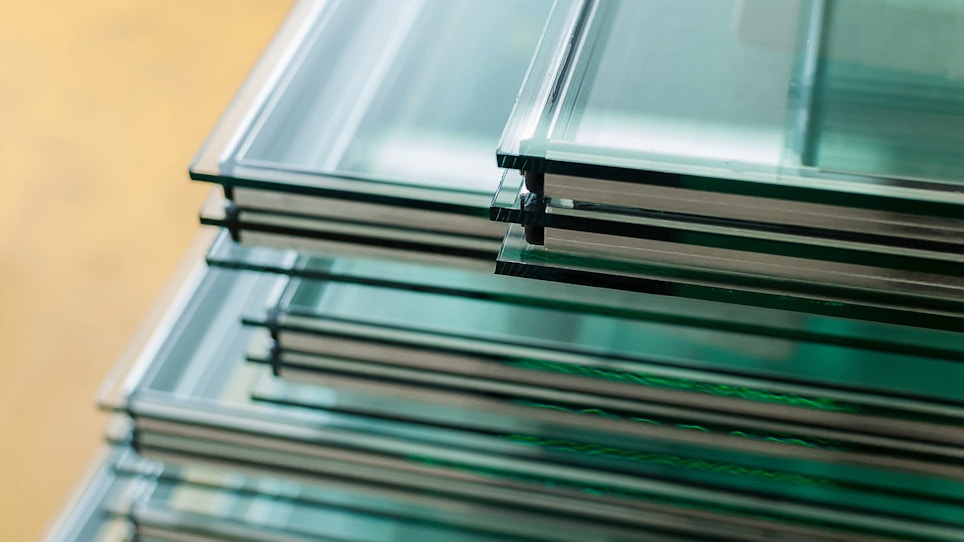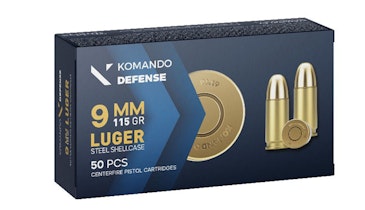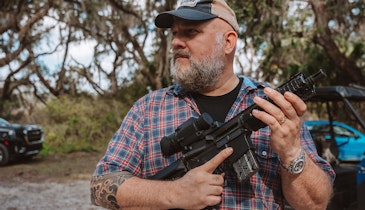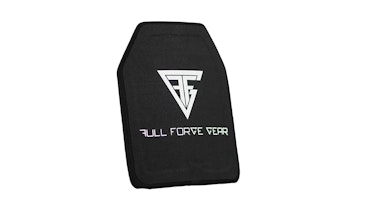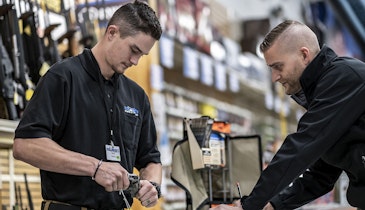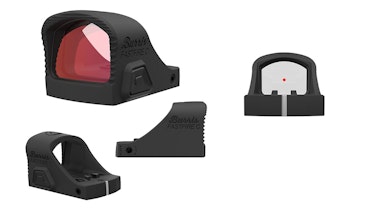A pane of glass is sometimes the only thing standing between a bad guy and your guns, other inventory, transaction records and other valuables. So, why not do just a little more to prevent an unwanted burglary via what is often the most vulnerable points of your store?
Upgrading the security of your store glass can make a major difference in your firearms protection program. Whether it be your front windows, a glass door or your handgun showcases, adding security film to your current glass or replacing windows with laminated glass can be your next smart burglary-prevention strategy. Let’s look at the various glass options to consider.
Glass Types
Unsecured glass is what we call “float” or plate glass. It is the very common type of glass used in home window applications. Such glass can be easily broken with blunt force and fractures into irregular shards with sharp edges. Plate glass offers protection from the elements but very little physical security.
The next step up is tempered glass. It is often referred to as safety glass because it is more resistant to breakage than normal float or plate glass. If it is broken, it usually breaks into relatively small pieces (higher quality tempered glass will break down into granular pieces, rather than shards) which are less likely to cause serious injury.
When it comes to protection against burglary, laminated glass is first on the list after tempered glass. From entrance doors and glass floors to aquariums and display cases, laminated glass is a near-perfect safety and commercial security solution.
With laminated glass, two or more panes of glass are bonded together by a durable plastic interlayer, which enables the glass to strongly resist penetration by impacting objects. If it should break, the glass will tend to remain in its frame, minimizing the risk of injury from sharp edges and flying or falling glass shards. This is because during breaking, the panes are held in place by that interlayer, typically of polyvinyl butyral (PVB) or ethylene-vinyl acetate (EVA).
Because of its strength and safety features, laminated glass is preferred for the following applications:
- Hurricane and impact resistance
- Protection against bombs or other explosions
- Protection against forced entry
- Protection from fallout of broken glass from building facades
- Earthquake resistance
- Protection from smash-and-grab thefts via storefront window displays
- Bullet resistance
Laminated glass, although a higher cost application, adds a protective layer of security that will deter and often prevent the average burglary, and its use in retail and commercial applications has steadily increased over recent years. Most high-risk retail locations selling jewelry and firearms now use laminated glass in showcase applications. Breaking into a store secured with laminated glass isn’t easy, as gaining entrance involves a lot of effort, a lot of noise and a lot of time. A bonus, laminated glass also provides a good degree of sound proofing in high vehicle traffic and other noisy areas, though the level of noise protection depends upon the quality of the laminate material.
Choosing The Right Glass For Your Store
When it comes to choosing which type of glass would serve your purposes well, there are a few things you need to consider. Ground level doors and windows made from laminated glass are a safe and secure bet, as these will likely be the most susceptible areas when it comes to breaking and entering. Laminated security glass can also be positioned on the inner or outer pane of a double-glazing window, but must be used with an appropriate framing system.
Laminated glass is available with different levels of safety and security, based on varying the number and/or thickness of each of the glass and interlayer components. The three main types of security glass are:
Glass-resistant to manual attacks: Double-glazing window resistant to manual attacks, such as a person armed with an axe or crowbar, must conform with specifications for prevention against vandalism and for burglary. This kind of security glass is laminated for safety and generally ranges in thickness from 6.5 to 25mm. It can also be supplied with integrated security alarms.
Bullet-resistant glass: Within this category, different levels of security glass are available to protect against the passage of bullets from various types of firearms ranging from pistols to shotguns. It will also prevent against flying shards of glass resulting from bullet impacts.
Explosion pressure-resistant glazing: Any premises located in a potentially hazardous risk area for explosions should use explosion pressure-resistant, double-glazing windows. Explosion-resistant glass is an effective way to minimize damage and injury that can be caused by an accidental or criminally induced explosion.
NSSF’s Store Security Audit team can help you assess the right glass application and security upgrades for your location. For more information, visit the Retailers section of the nssf.org site. NSSF also partners with a variety of vendors, including one that provides window security film products. Log in to the members-only side of nssf.org to discover more.
John Bocker is an NSSF Security Consultant Team Member and the Managing Director at JB Group, LLC, based in Denver, Colorado. JB Group is a business security and integrity strategy consultant organization specializing in maximizing profitability, risk management, employee integrity, operational controls. Featured photo: NSSF.
